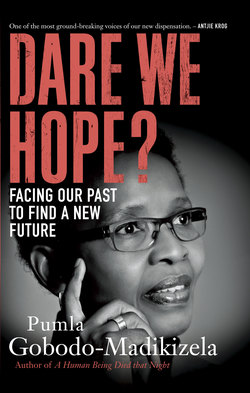Читать книгу Dare We Hope? - Pumla Gobodo-Madikizela - Страница 7
На сайте Литреса книга снята с продажи.
1. Facing the truth in South Africa
ОглавлениеThe Washington Post, 1 November 1998
Serving on South Africa’s Truth and Reconciliation Commission as a coordinator of the public hearings in the Western Cape gave me an opportunity to witness its limitations and achievements at first hand. When, in late 1998, the commission released its final report, I felt the public reactions confirmed that the task of dealing with our past had still not been concluded.
THE LONG-AWAITED final report of South Africa’s Truth and Reconciliation Commission (TRC), which was released last week, will lay nothing to rest. It appears at a time when the South African public has tired of the commission, and become sceptical about its benefits. White people are increasingly negative about everything – the economy, crime, affirmative action, and a government run by a cabinet that is mainly black.
These negative attitudes are a screen against confronting the reality of their contribution to apartheid, a system that oppressed the majority of South Africans for the enrichment of a few, and their status as beneficiaries of its privileges. Perpetrators continue to struggle with the effects of public shaming and of being exposed as the doers of evil deeds.
Some victims are also unhappy. They have not seen any benefit from having come forward to the commission to share their stories of anguish. Their hopes were wearing thin until the first reparation payments were made recently to a few victims, a process seen as too little, too late.
The TRC has forced white people to reckon with their role as bystanders and beneficiaries of apartheid privilege. Many of them have refused to face this truth, which threatens their sense of humanity. Instead, they have been excessively critical of the post-apartheid government and its efforts towards transformation, which they regard as a threat to the privileges they were used to under apartheid.
The struggle by perpetrators of apartheid atrocities is a struggle to find meaning in their past. Unlike their political opponents – those who fought in the liberation movement, and are able to salvage some sense of meaning from the acts of violence – there are few threads of meaning to link apartheid perpetrators to the past. Exposed in shame through the TRC’s work, perpetrators often tried to minimise the extent of their involvement in atrocities by continuing to lie, as if they would not have to tell the whole truth and could get away with murder once again, as they were used to, with denial and solidarity in the lie.
Victims were unhappy because they felt the TRC had abandoned them and did not fulfil the promises it had made. The commission addressed some of their emotional needs arising out of traumatic memory, but they had to return to the reality of their unchanged economic situation. Putting a face to the perpetrators who had brought them years of anguish, and knowing the facts about how it happened, removed some of the emotional burden they had carried over the years, but this did not improve their life circumstances.
Very few people will appreciate the TRC’s most valuable achievements. Perhaps the most valuable is its attempt to answer the question: how can a country move forward from a history of oppression and violence without destroying itself with revenge?
It is not surprising that attitudes to the TRC are critical. It has been a pain-filled process for everyone, and people are still dealing with bitterness, guilt, disappointment, anger and grief. But the report presented last Thursday should be seen as part of dealing with the past and of seeking reconciliation, even if such reconciliation will not come in this generation.
While some victims have been unhappy about having come forward with their stories, many others feel an incredible sense of validation after having testified at the public hearings. For these victims, nothing was more affirming than an opportunity to break the silence about the brutality they had experienced during the apartheid years.
The TRC allowed some victims and survivors to encounter their perpetrators in ways that would not have been possible in a court of law. Here lies one of its successes: the requests for forgiveness made by some perpetrators, and the granting of forgiveness by victims and survivors who are the primary generation of sufferers of atrocities, are unprecedented in the history of atrocities in the 20th century. Its greatest success is the fact that South Africa has not plunged into a spiral of violence and revenge.
